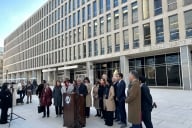You have /5 articles left.
Sign up for a free account or log in.
Actions by North Idaho College’s Board of Trustees have already prompted scrutiny from its accreditor, but now Moody’s Investor Services is considering a downgrade to NIC’s bond ratings, citing “governance considerations, including board structure,” The Coeur d’Alene Press reported.
“The board members’ very public disputes with one another, college leadership and external parties are negatively impacting NIC’s brand, which in turn could negatively impact student demand and operations,” Moody’s said in a news release, according to the newspaper.
That warning comes amid dramatic change at the college driven by a new board majority that formed after the most recent election in November. Since then, one new trustee has joined two holdovers on the five-member board to hire a new college attorney without a bid process or interview, freeze executive hiring, and place President Nick Swayne on leave for unclear reasons. (Contacted by phone, the new attorney, Art Macomber, hung up on a reporter who asked why Swayne was placed on administrative leave.)
With Swayne sidelined, the board hired Greg South as interim president on a 3-to-2 vote. South previously served as an interim dean at NIC in fall 2021. NIC officials did not provide a copy of the contract to Inside Higher Ed, as requested, but Idaho Ed News reported that South’s contract runs through June 2024. South is set to receive a $35,000 signing bonus and an annual salary of $235,000, $5,000 more a year than Swayne. Trustees Todd Banducci and Greg McKenzie, who voted to approve South’s contract, previously argued that the salary range for Swayne was too high when he was hired last year.
Beyond scrutiny from Moody’s and the college’s accreditor, the Northwest Commission on Colleges and Universities, the college is also facing two lawsuits prompted by recent board actions. One lawsuit was filed by Swayne, who is seeking reinstatement. The other lawsuit, filed by former Coeur d’Alene city attorney Mike Gridley, seeks the nullification of any illegal actions by the board, which recently admitted to three violations of open meetings laws in December.




